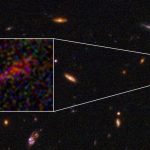Key Takeaways:
- Physicists have proposed a new calculation for when the Universe might stop expanding and eventually collapse, a process they suggest could occur in tens of billions of years.
- Although this timescale may seem extremely long by human standards, on a cosmological scale, researchers consider this collapse to be “imminent,” which raises concerns.
- The study attempts to address the mystery of why the Universe’s expansion rate is currently accelerating and explores the role of dark energy in this phenomenon.
- Dark energy, comprising approximately 68 percent of the Universe, plays a crucial role in balancing the expansion of the Universe. It coexists with dark matter (27 percent) and ‘normal’ matter (less than 5 percent).
- The proposed ‘cosmological collapse mechanism’ suggests that the Universe’s initial conditions naturally lead it to its current state of acceleration, followed by an eventual turnaround point leading to collapse in a ‘big crunch.’
Is the Universe heading for a collapse much sooner than anticipated? Physicists have introduced a novel calculation that points to the Universe halting its expansion and ultimately imploding, potentially within the next tens of billions of years.
While this vast timeframe might seem remote in human terms, scientists view it as an impending event on a cosmological scale, causing concern.
This study delves into one of physics’ most challenging questions: why is the Universe presently experiencing an accelerated expansion? Over a century ago, Albert Einstein introduced the ‘cosmological constant’ to account for the energy density of the vacuum in space and balance the gravitational pull of matter.
However, when astronomer Edwin P. Hubble revealed the Universe’s expansion, Einstein abandoned this idea. More recently, physicists have suggested that dark energy could fulfill this role.
Dark energy, a low-mass form of energy constituting roughly 68 percent of the Universe, coexists with dark matter (27 percent) and ‘normal’ matter (less than 5 percent). The problem lies in the fact that, theoretically, such a high proportion of dark matter should lead to the formation of a much smaller Universe, as it would expand too rapidly for galaxies to develop.
According to the proposed ‘cosmological collapse mechanism,’ the Universe’s initial conditions naturally lead to its current state of accelerated expansion, with an eventual transition to contraction, culminating in a ‘big crunch.’ The research has been published in the journal Physical Review Letters, intriguingly titled ‘The End.’
Antonio Padilla from the University of Nottingham, one of the researchers, suggests that this approach may offer new insights into the long-standing challenge known as the cosmological constant problem.
While it is premature to declare the theory conclusive, it has so far withstood scrutiny, addressing the contributions of vacuum energy from the standard model and how they influence gravity.
While this concept may be challenging to grasp, it offers a lengthy window of tens of billions of years to prepare for the Universe’s potential collapse, should the researchers’ ideas prove accurate.


